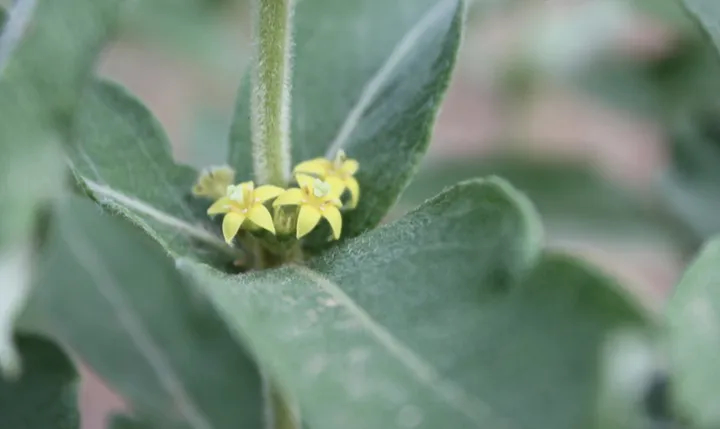In the heart of Nigeria, amidst the lush landscapes, thrives a shrub shrouded in mystery and allure: Fadogia Agrestis. Revered for centuries in traditional medicine, this unassuming plant has sparked a global sensation. Imagine a natural remedy, whispered about in local communities, now taking the world of supplements and alternative health by storm with its rumored aphrodisiac powers. This is more than just folklore; it’s a blend of ancient wisdom and modern curiosity.
As Fadogia Agrestis gains fame, scientists and health enthusiasts alike are delving deeper. Beyond its enchanting love-enhancing qualities, emerging studies hint at a power to regulate blood sugar and shield the heart, offering a beacon of hope in the world of natural health solutions. Yet, amidst this excitement lies a tale of caution: the need to navigate the delicate balance between traditional beliefs and scientific scrutiny. Will Fadogia Agrestis live up to its promises, or is it merely a siren call of nature? The quest for answers is just beginning, beckoning us to join the journey into the heart of this enigmatic plant.
Key Takeaways
- Fadogia Agrestis is a Nigerian shrub traditionally known for its aphrodisiac properties
- The plant may offer additional health benefits, including blood sugar control and cardiovascular risk reduction
- It is crucial to critically assess the scientific evidence supporting the claims about Fadogia Agrestis benefits before incorporating it into your health regimen

Description and Origin
Fadogia Agrestis is a flowering plant indigenous to Nigeria and other countries in West Africa. It belongs to the Rubiaceae family, and has recently gained popularity as a herbal supplement due to its potential health benefits1.
This plant can be found in various West African countries, with some species even extending as far as Sudan and Ghana. It has been traditionally used in the region for various medicinal purposes, including reducing fever, acting as an aphrodisiac, and treating erectile dysfunction2.
In West Africa, ethnobotanical surveys have been conducted to document traditional knowledge and applications of Fadogia Agrestis, which has become an essential herb in these communities. The plant is also cultivated and utilized in other African countries like Burkina Faso3.
Fadogia Agrestis thrives in tropical environments, and the countries with the highest number of its species include Angola, Democratic Republic of the Congo, Zambia, Tanzania, and more1.
With a rich history and a wide range of traditional uses, Fadogia Agrestis is now being recognized globally for its potential benefits in modern-day herbal medicine.

Traditional Use
Fadogia Agrestis, a native plant species primarily found in West Africa, has been used for centuries in traditional African medicine. Practitioners have sought the plant’s properties for various purposes, such as treating fever and rheumatism, but the primary use of Fadogia Agrestis has been as an aphrodisiac to improve libido and sexual performance.
This plant, known as the “Black Aphrodisiac,” contains various compounds, including flavonoids, lignans, phytosterols, and triterpenoids, which are believed to contribute to its therapeutic properties. It has been traditionally used to enhance libido, increase strength and energy levels, and improve overall sexual health. Some evidence suggests that glycosides, a type of saponin found in Fadogia Agrestis, might be responsible for its testosterone-boosting effects, contributing to its wide use for sexual dysfunction.
Incorporating Fadogia Agrestis as a remedy for sexual issues was not limited to men, as women also utilized the plant to increase their sexual desire and energy. Moreover, the plant’s properties have been used to address factors affecting sexual performance, such as fatigue and stress, promoting overall well-being and improved sexual behavior.
However, despite its historical use and potential benefits, Fadogia Agrestis is not without safety concerns and warrants further investigation into its efficacy and toxicity. It is essential for individuals seeking to take advantage of its potential to maintain a cautious approach and consult with healthcare professionals before using this traditional remedy.

Health Benefits and Claims
Fadogia agrestis, a perennial herb native to West Africa, has been traditionally used to treat various medical conditions, such as fever and malaria. In recent years, it has gained attention for its potential health benefits, particularly in relation to testosterone levels, muscle mass, energy levels, and aphrodisiac effects.
Research on Fadogia agrestis has shown remarkable increases in testosterone levels in rodents when supplemented for 5 days. These results are dose-dependent, with 100 mg/kg showing a 6-fold increase in testosterone. This boost in testosterone is thought to be responsible for the plant’s aphrodisiac effects, as well as other potential benefits like improved muscle mass and energy levels. However, it is important to note that the study was conducted on rodents and more research is needed to determine if these benefits apply to humans as well.
Apart from its testosterone-boosting properties, Fadogia agrestis may also offer other health benefits such as improved muscle mass, strength, and assistance in treating erectile dysfunction. These benefits could be particularly appealing to athletes and individuals looking to improve their overall physical performance.
While there are promising findings, it is crucial to understand that research on Fadogia agrestis is still limited. Some claims, like increased athletic performance, lack sufficient research support. It is important for consumers to approach these claims with caution and rely on reputable sources to determine the efficacy and safety of Fadogia agrestis.
Lastly, though studies have demonstrated the potential benefits of Fadogia agrestis, understanding the appropriate dosage and potential side effects is essential for safe consumption. More research is needed to solidify the benefits and safety of this plant for humans.

Phytochemical Components
Fadogia agrestis, an African shrub, has been traditionally used in African medicine for its various therapeutic properties. The phytochemical components present in Fadogia agrestis primarily include glycosides, alkaloids, saponins, and flavonoids, which collectively contribute to its analgesic, anti-inflammatory, and aphrodisiac properties.
Various studies have explored the presence and quantification of phenolic compounds in Fadogia agrestis. Researchers have developed an ultra-high-performance liquid chromatography method for the determination of 11 chemical constituents from the roots and aerial parts of the plant. This method enables the identification and confirmation of various compounds in the plant samples and dietary supplements, including flavonoid content and other phenolic compounds which exhibit antioxidant activities.
In addition to flavonoids, Fadogia agrestis contains alkaloids that are known for their various pharmacological effects. The presence of these alkaloids is associated with the plant’s traditional use for alleviating kidney pain, reducing fever, and producing diuretic effects.
The significance of these phytochemical components goes beyond their individual benefits. Their combined effect in Fadogia agrestis contributes to the plant’s overall therapeutic properties and influences its use in traditional medicine. The stem extract of Fadogia agrestis, for example, has been studied for its effects on mitigating oxidative stress in male rats resulting from acetaminophen-induced damage. The findings indicate a potential role of the plant’s chemical components, including glycosides, alkaloids, and saponins, in combating oxidative damage and restoring normal physiological functions.
In conclusion, Fadogia agrestis holds a rich phytochemical profile with a variety of biologically active compounds like glycosides, alkaloids, saponins, and flavonoids. These components, along with their antioxidant activity, form the basis for the plant’s traditional therapeutic uses and continue to inspire further research into its potential medical applications.

Scientific Studies
Fadogia agrestis, a short bush plant native to Nigeria, has been traditionally utilized for its potential aphrodisiac properties and as a remedy for erectile dysfunction 1. Over the years, several scientific studies have been conducted to investigate these claims, focusing on how the plant impacts sexual function.
In a study that analyzed the effects of Fadogia agrestis on male albino rats, the aqueous extract of this plant was administered in varying dosages 2. The results of this study demonstrated a dose-dependent increase in serum testosterone levels, testicular weight, and ejaculatory latency. Notably, at a dose of 18 mg/kg body weight, which is typically used in folklore medicine, the plant extract significantly improved testicular function and overall sexual performance.
Another research observed the influence of Fadogia agrestis stem extract on erectile dysfunction by comparing its effects to sildenafil citrate 3. The study found that the extract increased penile and testicular nitric oxide, cGMP, catalase, SOD, T-SH, GSH, and GST, while reducing AChE, PDE5, arginase, ACE, TBARS, and H levels. These changes were comparable to those produced by sildenafil citrate, a commonly prescribed medication for erectile dysfunction.
Despite the promising results, some researchers have raised concerns over the potential adverse effects of Fadogia agrestis on testicular function 2. While the aforementioned study observed improvements in sexual performance, it also noted alterations in the rats’ testicular function, indicating that high dosages of the extract could be potentially harmful.
However, further investigations are necessary to fully understand the safety and efficacy of Fadogia agrestis in treating sexual dysfunction and erectile dysfunction. Due to the limited number of studies available, it is crucial to conduct more comprehensive research on this plant, giving proper consideration to its potential benefits, risks, and mechanisms of action.

Side Effects and Safety
Fadogia Agrestis is a plant traditionally used for its purported aphrodisiac, pro-erectile, anti-malarial, and anti-fever properties. However, research on this plant is scarce, and there are no human studies conducted to date, which makes it difficult to determine its safety profile and potential side effects 1.
While concrete information on the side effects of Fadogia Agrestis is limited, it is essential to approach its use with caution, especially for individuals with pre-existing medical conditions such as diabetes, high blood pressure, or cancer. These conditions may be affected by the plant’s bioactive compounds and potentially result in adverse reactions 2.
Since there is insufficient scientific evidence to determine Fadogia Agrestis’s safety, it is crucial for pregnant or breastfeeding women to avoid its use. Additionally, individuals with weakened immune systems or those under medication should consult their healthcare providers before using Fadogia Agrestis to prevent any possible interactions 3.
In summary, Fadogia Agrestis holds some potential benefits, but due to the lack of comprehensive research, its side effects and safety profile remain undetermined. Individuals with medical conditions or those considering using Fadogia Agrestis in any form should consult with their healthcare providers to ensure a safe and informed choice.

Specifics of Fadogia Agrestis Use
Fadogia Agrestis, a plant originating from Nigeria, is becoming increasingly popular for its potential benefits in athletes and bodybuilders as a natural alternative to steroids source. Due to its purported effects on testosterone levels, it has gained attention in the realm of men’s health.
When incorporating Fadogia Agrestis into one’s regimen, it is crucial to consider proper dosing. Unfortunately, scientific research on this plant is limited; therefore, conclusive dosing guidelines are yet to be established. However, some users experiment with various dosages based on anecdotal evidence or recommendations from supplement manufacturers. It is always a good idea to consult with a healthcare professional before starting supplementation.
As for potential drug interactions, no substantial information is available. Due to the lack of research, it is prudent that users with pre-existing medical conditions or those on medications consult with a healthcare provider before using Fadogia Agrestis. This precaution also applies to individuals considering its use during pregnancy or breastfeeding, as no definitive information exists on its safety in such circumstances.
Although more research is needed to fully understand the properties and effects of Fadogia Agrestis, some studies have identified various compounds within the plant, such as glycosides, coumarin, flavonoids, lignans, phytosterols, and triterpenoids source. The glycosides (a type of saponin) are suspected of being responsible for the plant’s testosterone-enhancing effects.
In conclusion, Fadogia Agrestis has the potential to be an exciting addition to the world of natural performance-enhancing substances. However, its specific application warrants further research, particularly in the areas of dosing, interactions, and safety during pregnancy and breastfeeding. As always, consulting with a knowledgeable medical professional before beginning any new supplement iscritical for ensuring safety and effectiveness.
Where to Buy Fadogia Agrestis
Fadogia Agrestis is a popular supplement known for supporting testosterone levels and boosting athletic performance. For those interested in purchasing this supplement, there are various options available.

One of the most popular platforms to buy Fadogia Agrestis is Amazon. Amazon offers Fadogia Agrestis from a variety of suppliers, such as the highly-rated Dorado Nutrition store. This particular Fadogia Agrestis blend combines 600mg of Fadogia Agrestis and 400mg of Tongkat Ali in a 120-capsule pack. It is promoted as a non-GMO, gluten-free, vegan-friendly product designed to enhance strength, drive, athletic performance, and muscle mass.
Another online retailer that offers Fadogia Agrestis is Target. They have a 180 x 300mg capsule package formulated by Double Wood Supplements. This product aims to support healthy testosterone levels and improve athletic performance, particularly when it comes to resistance training results.
Additionally, Fadogia Agrestis can be found in powder form on Amazon. A 50:1 extract powder is available, providing a highly purified and bioavailable option for those who prefer a powder supplement. This product has a 4-ounce package and is advertised as non-GMO and gluten-free, with no additives or fillers.

It’s worth noting that before purchasing and using any Fadogia Agrestis supplement, it’s essential to consult a healthcare professional or refer to reputable sources such as WebMD for information on potential side effects, interactions, and optimal dosages. This ensures safety and effectiveness when incorporating Fadogia Agrestis into one’s wellness regimen.

Comparisons to Other Supplements
Fadogia Agrestis is a popular herbal supplement that has gained attention for its potential benefits, particularly in enhancing testosterone levels. When compared to other supplements, it’s essential to understand the similarities and differences in terms of effectiveness and overall benefits.
Tongkat Ali is another supplement that also aims to increase testosterone levels. Both Fadogia Agrestis and Tongkat Ali have been used traditionally for improving hormonal balance in men and women. However, Tongkat Ali tends to have more scientific research supporting its effectiveness in comparison to Fadogia Agrestis.
Spilanthes Acmella is a lesser-known herb that has been researched for its potential effects on testosterone production. It’s often compared to Fadogia Agrestis due to its similar properties. However, the available research on Spilanthes Acmella is still limited compared to the other supplements discussed here.
Tribulus Terrestris is another supplement often compared to Fadogia Agrestis. It is commonly used by athletes and bodybuilders to improve physical performance and support hormone production. While Tribulus Terrestris has been widely studied for its benefits in enhancing testosterone, the results are still controversial, and its effectiveness may vary from person to person.

Yohimbine differs from Fadogia Agrestis, as it primarily targets improving sexual performance and aiding weight loss. It is an alkaloid extracted from the bark of the Yohimbe tree and is known for its stimulant-like effects. Yohimbine may be more suitable for individuals looking to enhance their sexual performance or those seeking additional support for metabolic functions.
While Fadogia Agrestis shares some benefits with these supplements, each has unique properties and potential effects. It is crucial to consider individual needs and preferences when deciding which supplement best aligns with one’s goals. Additionally, it is always recommended to consult with a healthcare professional before starting any new supplement regimen.
Regulatory Status
Fadogia Agrestis is a plant native to Nigeria and has gained popularity as a natural supplement for athletes and bodybuilders, who seek a safe and effective alternative to anabolic steroids. As a herbal supplement, it is not subject to the same regulatory standards as pharmaceutical drugs.
In the United States, the Food and Drug Administration (FDA) classifies dietary supplements, including herbal ones, as part of the food category rather than pharmaceuticals. This means that the FDA does not evaluate or approve these supplements for safety or effectiveness before they reach the market, nor does it directly regulate their production or sale.
However, the FDA does require manufacturers of dietary supplements like Fadogia Agrestis to comply with Good Manufacturing Practices (GMPs) to ensure their quality and safety. The agency also monitors reported adverse events and can take action against products found to be contaminated, misrepresented, or improperly labelled.
While the Natural Medicines Comprehensive Database (NMCD) is a widely-recognized authoritative source for evaluating the safety and effectiveness of natural products, Fadogia Agrestis is still a relatively new and under-researched supplement. As a result, it may not yet have a comprehensive assessment in the NMCD, which could result in limited available information about its safety, efficacy, and potential interactions with other substances.
In summary, Fadogia Agrestis falls under the natural and herbal supplement category and is subject to FDA regulations for dietary supplements instead of pharmaceutical drugs. Although no explicit approval or evaluation is provided by the FDA or NMCD for its safety and efficacy, manufacturers are required to follow GMPs to ensure the quality and safety of their products.

Frequently Asked Questions
What is the recommended dosage for Fadogia Agrestis?
The recommended dosage for Fadogia Agrestis may vary depending on individual factors and reasons for use. It’s important to consult a healthcare professional before starting any new supplement, as dosage recommendations can vary.
Are there any side effects of Fadogia Agrestis?
Some potential side effects of Fadogia Agrestis may include gastrointestinal discomfort, such as mild nausea and diarrhea. In some cases, overconsumption could lead to hormonal imbalances, which may result in mood swings or, in extreme cases, gynecomastia in men. Allergic reactions are also possible.
What are the benefits of Fadogia Agrestis?
Fadogia Agrestis has been linked to several potential benefits, including increasing natural testosterone levels, which can improve muscle mass, endurance, energy, and sexual drive. Additionally, it may help combat fatigue and support hormonal balance.
Can Fadogia Agrestis boost testosterone levels?
Yes, some studies have suggested that Fadogia Agrestis can help boost testosterone levels in users. This increase in testosterone may contribute to its benefits, including enhanced muscle mass, endurance, energy, and sexual drive.
How does Fadogia Agrestis compare to Tongkat Ali?
Both Fadogia Agrestis and Tongkat Ali are natural herbal supplements traditionally used to enhance libido and improve sexual performance. While Fadogia Agrestis is more commonly associated with increased testosterone and reduced fatigue, Tongkat Ali is often linked to improving sperm quality and supporting athletic performance. It’s important to consult with a healthcare professional to determine which supplement is most suitable for individual needs.
Is Fadogia Agrestis considered an anabolic steroid?
No, Fadogia Agrestis is not considered an anabolic steroid. It is a natural plant from Nigeria that has been popularized as a safer and effective alternative to steroids, particularly among athletes and bodybuilders.
Footnotes
- https://www.codeage.com/blogs/education/fadogia-agrestis-a-comprehensive-look-at-its-origins-biology-and-properties ↩ ↩2 ↩3 ↩4
- https://www.supplementcritique.com/fadogia-agrestis-review/ ↩ ↩2 ↩3 ↩4
- https://en.wikipedia.org/wiki/Fadogia ↩ ↩2 ↩3
- Why is My Poop Black: Uncovering the Causes and Solutions - December 21, 2023
- Clear Protein Drinks: Optimal Hydration and Muscle Support for Athletes and Fitness Enthusiasts - December 21, 2023
- Does Apple Juice Make You Poop: Uncovering the Digestive Effects - November 29, 2023








